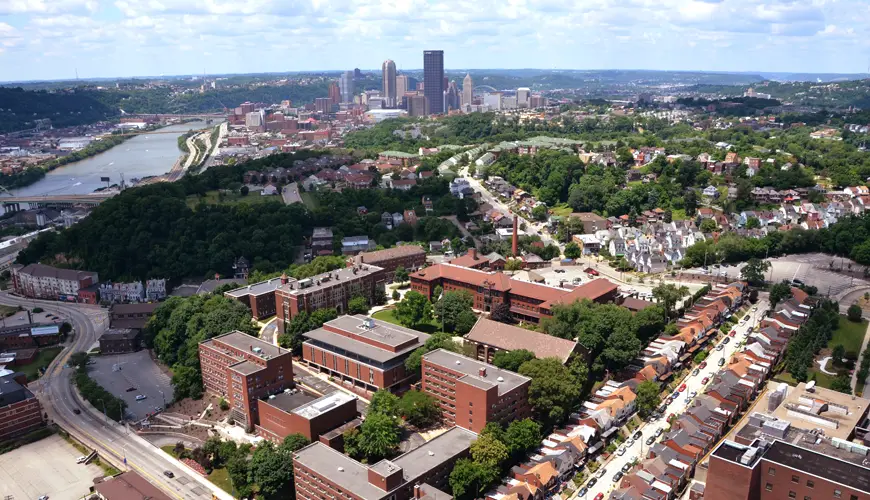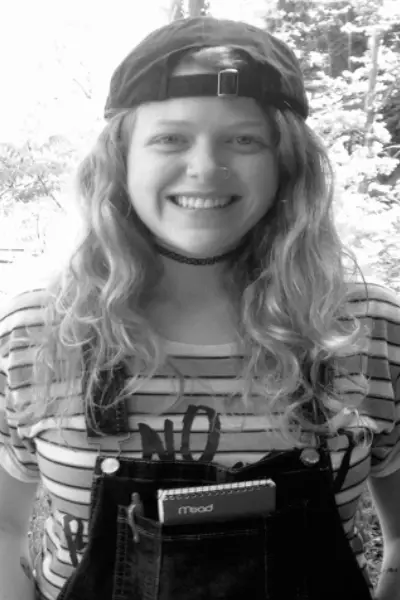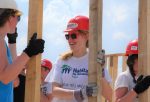Carlow University is a relatively small school, averaging around 2,500 total students enrolled.
The campus is located in Pittsburgh, Pennsylvania, but more specifically—the city of Oakland. Neighboring universities tend to cast a shadow over Carlow: Carnegie Mellon’s got a killer reputation, and the University of Pittsburgh’s campus is practically the entirety of Oakland.
Sometimes, people ask me why I chose to attend Carlow when there are plenty of other options in Pittsburgh: Point Park University, The Art Institute of Pittsburgh and Duquesne University, to name a few. My answer is simple: Carlow University has something they don’t have. As a mercy institution, Carlow puts a focus on service, women, social justice and inclusivity. Students’ opinions are important, they don’t go unnoticed by faculty or staff and Carlow’s welcoming environment allows them to flourish and express themselves fully.
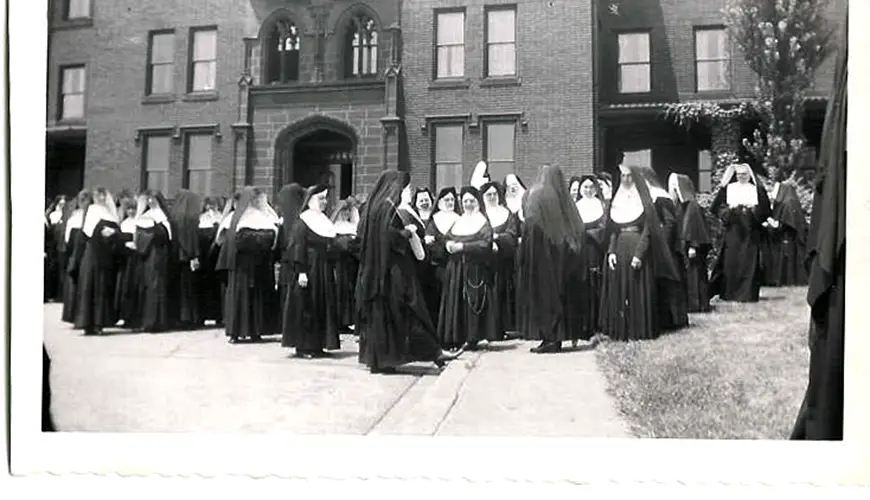
Carlow was founded by the Sisters of Mercy, who traveled to Pittsburgh, Pennsylvania, from Carlow, Ireland in 1843. It was Mount Mercy College until they renamed it Carlow College in 1929, and eventually were granted university status in 2004. The Sisters of Mercy made it their mission to serve the poor, sick and uneducated regardless of race, nationality, age, gender, religion, socioeconomic status or sexual orientation. Carlow continues to fulfill the sisters’ mission in numerous ways.
Carlow’s Office for Mercy Service encourages collaboration between students and volunteer programs throughout the city of Pittsburgh, all the while providing the Carlow community with year-round service opportunities, including Mercy Service Day and Alternative Spring Break.
Mercy Service Day occurs every September. The day is dedicated to connecting Carlow students to different community organizations throughout Pittsburgh. Every first year student is required to participate, as part of familiarizing them with Carlow’s mission statement: “Carlow University, rooted in its Catholic identity and embodying the heritage and values of the Sisters of Mercy, offers transformational educational opportunities for a diverse community of learners and empowers them to excel.”
Although I’m not a first year student, I accompanied a group of them to The Blessing Board, a non-profit that focuses on furnishing peoples’ homes and providing them with necessary household items. The Blessing Board takes stress away from families who can’t afford the items, anyone escaping an abusive relationship or anyone who lost their home in a fire—everything they have has been donated to them. Other groups of students attended Habitat for Humanity Pittsburgh, Jubilee Kitchen and Sojourner House: Aiding women and children who struggle with poverty or addiction. Mercy Service Day is a Carlow tradition, inspiring students to put in volunteer hours on their own time.
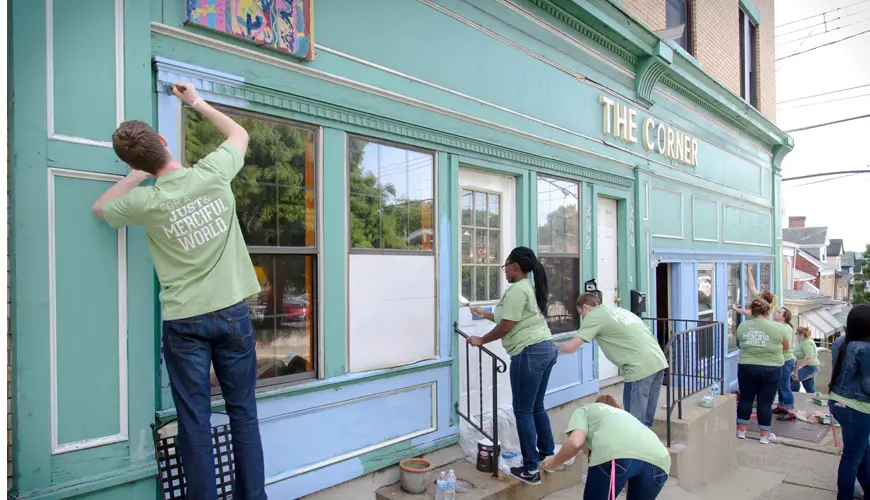
I participated in Alternative Spring Break my first year and sophomore year. I traveled to Laredo, Texas, with a group of students, teamed up with Habitat for Humanity Laredo and built homes for families in need. I didn’t go on the trip either time to build my resume, or because I wanted to travel. I spent two weeks in Laredo, Texas, because I knew there were families that needed help. I wanted to personally connect myself to the people I was helping by working with them. The Alternative Spring Break experience certainly increased my knowledge of social issues. Each night my peers and I reflected upon the work we accomplished together, discussed immigration, poverty issues and homelessness in Laredo.
Students can also spend spring break in Pittsburgh, and previous student groups have traveled to New Orleans, North Carolina and Florida. Carlow’s preparing students for a lifetime of sacrifice and service. Students are constantly reminded to respect others’ differences, and apply intersectionality to their activism both on and off campus.
In addition to being a mercy institution, Carlow is also women-centered. The university was founded by women, and faculty, staff and students support women in positions of leadership. One example of this is the Vira I. Heinz (VIH) Program for Women in Global Leadership. Universities across Pennsylvania participate in the program, and four Carlow students received scholarships to study abroad this past summer. The program prepares women to apply what they learn abroad to their lives at home: Think globally, act locally.
The Sisters of Mercy were motivated by the needs of the marginalized—people with lost voices that often go unheard. Carlow students are individuals who engage with people most in need. Carlow University strongly focuses on protecting the environment and fighting racism.
Former Director of Inclusion and Intercultural Initiatives Barbara Johnson facilitated monthly discussions about police brutality, racism and privilege while at Carlow. Students were becoming much more aware while confronting conflict and discomfort, asking difficult questions and listening. More importantly, students were (and currently are) given opportunities to brainstorm different ways to combat police violence and racial injustices in Pittsburgh.
Last spring Georgette Norman, former director of the Rosa Parks Museum, spoke at Carlow about the displacement and replacement of African American communities, and the influence on the city of Pittsburgh. Norman asked students to listen, and encouraged them to get involved. Carlow is always inviting guest speakers to the university to tell personal stories, inform students and others about happenings in Pittsburgh and how they can be a part of the change, connecting well with Carlow’s focus on social justice.
Also, every first year student is sent a book over the summer to read before they start classes. This year, students read “How Does it Feel to be a Problem? Being Young and Arab in America” by Dr. Moustafa Bayoumi.
In the book, Dr. Bayoumi tells the stories of eight different Arab-Americans navigating America while trying to embrace their Muslim faith.
Dr. Bayoumi was invited to speak at Carlow just a couple of weeks ago—he discussed his book with students in an intimate setting. The book is incredibly relevant, considering the current state of our Presidential Election. Carlow students are well-informed, aware of what’s happening in the world and given resources to make their lives (and the lives of others) better.
Every single day Carlow students are exposed to opposing views. They are different because they look at people unlike them, and see having intelligent, well-thought-out conversations as opportunities to learn and grow. Before becoming a Carlow student, the word “mercy” didn’t mean anything to me. Now, when I think “mercy,” I think humanity and forgiveness.
Carlow’s campus may be hidden among the University of Pittsburgh buildings, but Carlow is full of powerful students with important ideas. I commit small acts of service every day, and I know I will continue to do so beyond my undergraduate stay at Carlow University. When I see something bad is happening, whether it be in Pittsburgh or somewhere else in the world, I don’t think, “How terrible,” I think, “What can I offer, and how can I help?” I owe that to Carlow University’s focus on service learning and leadership.


